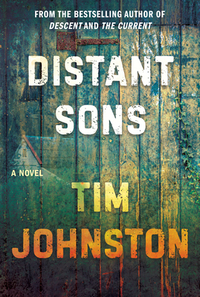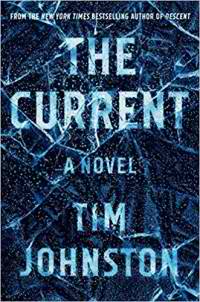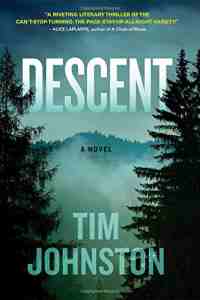Distant Sons by Tim Johnston
 Wednesday, October 18, 2023 at 7:06AM
Wednesday, October 18, 2023 at 7:06AM 
Published by Algonquin Books on October 17, 2023
Distant Sons is the story of two young men following the same path, men who meet by coincidence or fate. They are both on the move, both trying but failing to leave their pasts behind, both uncertain they should allow that choice to be dictated by others. The crimes that underlie the plot — three boys who went missing forty years earlier, a women who has been dead ten years — lurk in the background, but the story’s suspense surrounds the choices the young men will make as they move forward with lives that have suddenly intertwined.
Sean Courtland is a carpenter. He has driven into Wisconsin from Minnesota when his car overheats. A man who gives him a ride to a mechanic tells him about an old man named Devereaux who needs a carpenter. Devereaux wants to build a first-floor laundry room because he’s become too old to walk up and down the basement stairs.
Sean gives Devereaux a call. He takes the job despite rumors that connect Devereaux to three boys who disappeared forty years earlier. Sean expects the project to take about a week but realizes he might need to help to get it done within that time frame.
Sean offers a ride to a young man named Dan Young. They chat a bit and Sean offers Dan a job helping with the plumbing on the Devereaux job. Dan left his truck in Minnesota after someone put a bullet hole in it. Dan is suspected of causing a woman’s death ten years earlier. The suspicion is probably unfounded, but who knows?
Dan notices something odd about the carpentry in the basement. Sean has noticed that Devereaux’s dog whines whenever someone goes into the basement. While this isn’t a supernatural thriller, Dan has visions that make him wonder whether Devereaux or his creepy uncle or both are responsible for crimes that have long gone unsolved.
Setting aside ancient crimes, Sean intercedes when he sees Blaine Mattis bothering Denise Givens, a waitress in a tavern where Sean has been eating his meals. Sean accidently smacks Denise’s face she he tries to punch Blaine but Denise tells the investigating officer that the blow was accidental. Sean ends up dating Denise and even does a small home renovation that will help her father navigate his wheelchair through a doorway. Denise gets a restraining order against Blaine but he isn’t the kind of guy who cares.
Distant Sons unfolds over the course of an eventful week. It is a bad week for both Sean and Dan, arguably a bad week for everyone whose lives intersect theirs. While Sean blames himself for being a harbinger of doom, Denise’s father reminds Sean of Shakespeare's observation about “wills and fates” that “contrary run.” Maybe Sean made life worse for some by coming to the small Wisconsin town where he meets Dan and Denise, but maybe he made life better for others. In the end, balancing good and bad is beyond Sean’s power. He can only do what he thinks is right and hope for the best.
Tim Johnston captures the quiet eloquence of capable men who feel deeply but say little, men who don’t vocalize their thoughts unless the effort of expression seems worthwhile. The mystery of the missing boys is ultimately resolved, but this isn’t a story about heroic efforts leading to a serial killer’s capture. It is a simpler story of people poking around the edges of mysteries, people whose lives are at risk for reasons they cannot reasonably anticipate. It is a powerful and surprising story of fates that run contrary to wills.
RECOMMENDED

